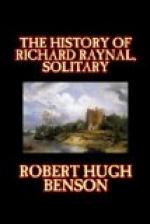Down from his temples across his cheeks ran little drops of sweat on to his brown frock, and that though it was a cool evening, and his spade was hung on its peg beneath the window. (It was the spade that you have seen in the church with a cross-handle polished by his holy hands.)
I looked for a while, and I grew yet more afraid. It seemed to me that there was somewhat in the cell that I could not see. I looked up at the window but there was nothing there but the still green hazel leaves; I looked at his bed, at the smooth mud walls and floor, at the domed roof, and, through the hole in the centre, where the smoke escaped when he made a fire, I could see leaves again and the evening sky. Yet the place was full of something; there was something of energy or conflict, I knew not which: some person was striving there.
Then I was suddenly so much afraid that I dared not stay, and I went back again along the path, and walked at the lower end of the meadow beside the stream.
Of the Word from God that came to Master Hermit: and of his setting out
Vias tuas, Domine, demonstra mihi: et semitas tuas educe me.
Shew, O Lord, Thy ways to me: and teach me Thy paths.—Ps. xxiv. 4.
II
There are, as you have learned from me, and I from Master Richard Raynal, a trinity of natures in man. There is that by which he has to do with the things of matter—his five wits; that by which he has to do with God Almighty and the saints—his immortal soul and her powers; and, for the last, that by which he has to do with men—his lower understanding, his mind, his power of speech, and the like. Each nature has its proper end, though each ministers to the other. With his ears he hears God’s Word, with his immortal soul he perceives God Almighty in what is seen with the eyes; with his understanding he comprehends the nature of flowers and the proper time to sow or reap. This trinity may be devoted to God or the fiend.... It is not true, as some have said, that it is only with the soul that God is perceived or served, and that the other two are unclean. We may serve God by digging with the hands, by talking friendly with our neighbour, and by the highest of all which is contemplation.
This is what Master Richard did, following the Victorines but not altogether. He strove to serve God alike in all, and I count his life, therefore, the highest that I have ever known. He said that to dig, to talk over the gate with a neighbour, and to contemplate the Divine Essence, were all alike to serve God. He counted none wasted, for God Almighty had made the trinity of natures in His own image, and intended, therefore, a proper occupation for each. To refuse to dig or to talk was not to honour contemplation; and this he said, though he said besides that some could not do this through reason of finding that one distracted the other. I count, however, that his own life was the hardest, for he did all three, and did not suffer one to distract another.




